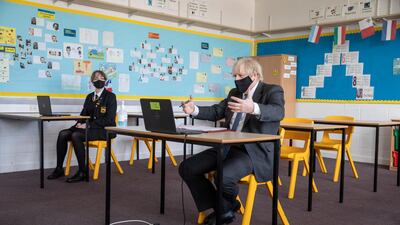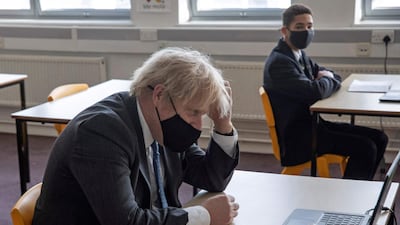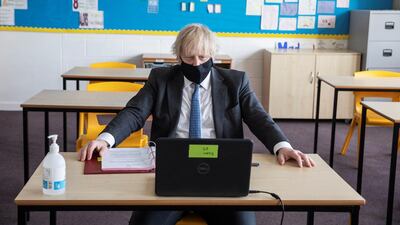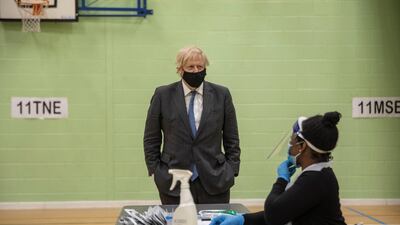Britain plans to use its presidency of the G7 to push for an internationally recognised system of vaccine passports that could allow world travel to resume.
But UK Prime Minister Boris Johnson acknowledged on Tuesday that the idea raised complex ethical issues.
The government previously said it was not considering issuing vaccine passports to people who had been inoculated.
But it has now set up a review into “Covid status certification” that will look at ways people can prove they do not have the coronavirus, through vaccination or a negative test result.
The government said it would “look to introduce a system to allow vaccinated individuals to travel more freely internationally".
It said it would work with other countries through the World Health Organisation, the Group of Seven wealthy countries and other bodies on “a clear international framework with standards that provide consistency for passengers and industry alike".
“Introducing such a system also needs to be fair and not unduly disadvantage people who have yet to be offered or gain access to a vaccine,” the government said in a document outlining its plans to lift pandemic restrictions.
“That being the case, the government does not expect this solution to be available quickly and restrictions like those in place across the world are likely to continue for the near future.”
The British government is also looking at how such proof might be used by employers, venue owners or organisers of large events.
One option under consideration is using the National Health Service contact-tracing app, which millions of people in Britain have on their phones, to display Covid-19 test results.
Mr Johnson said on Tuesday that “there are deep and complex issues that we need to explore” before making a decision.
“We can’t be discriminatory against people who for whatever reason can’t have the vaccine,” he said.
“There might be medical reasons why people can’t have a vaccine. Or some people may genuinely refuse to have one.
"I think that’s mistaken, I think everybody should have a vaccine but we need to thrash all this out.”
Status does not impress Liberty
Campaign group Liberty said that vaccine passports could create a two-tier society.
“Ministers have flip-flopped on the idea of immunity passports for months before quickly backing out again when faced with immense backlash,” said Liberty's head of policy and campaigns, Sam Grant.
“Renaming them ‘status certificates’ does nothing to address the fact that they would create a two-tier society, where some people can access support and freedoms while others are shut out – with the most marginalised among us hardest hit.”

Dr Mike Tildesley, who advises the government on infectious diseases, said resistance to inoculation was high in parts of the UK.
That raised the possibility of discrimination against people from parts of the country where vaccine acceptance is low.
“This is a real concern," Dr Mike Tildesley told BBC Radio 4.
"We may end up in a situation where we have the ‘vaccine rich’, as it were, who are able to access the vaccine, who have taken up the vaccine and are at much lower risk, and maybe the people in society who have not taken up the vaccine.
“Potentially, these individuals could be clustered in particular parts of the country and there is increased risk there.”
Under the government’s road map out of lockdown for England, international travel will resume on May 17 at the earliest.
At that point, requirements for arrivals from 33 red-list countries, including the UAE, South Africa and all of South America, could be abolished.
Surge in holiday bookings
The government said the case for vaccine passports would be assessed as a long-term measure.
Greece, which is involved in talks with the UK on the issue, called on Europe to “move more quickly” to give priority to vaccine passports.
"Looking at the reaction of some countries to vaccination certificate proposals, I feel there's a lot of short-sightedness," the Greek tourism minister, Harry Theocharis, told the Financial Times.
“There’s more to be done now to prepare ourselves. We need to move more quickly.”
EasyJet said flight bookings from Britain jumped more than 300 per cent and holiday bookings by more than 600 per cent week on week after the road map was published.
Holiday company TUI UK said that its bookings surged 500 per cent, while holiday and budget airline group Jet2 said its bookings were up 600 per cent.
Travel site Skyscanner said flight bookings made on Monday were 69 per cent higher than the previous day, with visitor numbers to its flight-checking website jumping 55 per cent after the announcement.
"Our data show that travellers are very well tuned in to any updates about restrictions," Skyscanner flights chief Hugh Aitken said.
"We are seeing this latest news translate into a surge in travel demand."
The government’s road map rules out domestic holidays over Easter but says they can resume from April 12 at the earliest.
The British tourism industry is expected to boom with a surge in staycations when restrictions are lifted.
Paul Charles, of travel consultancy The PC Agency, said Monday’s announcement would “fill up the diaries of every holiday let within 24 hours”.
"I would expect demand to skyrocket for those weeks after April 12," Mr Charles told The Telegraph. "It's the message that the travel sector wanted from the PM."
Visit Britain director Patricia Yates said the road map gave the industry some certainty.
"I think the industry will be reassured with the road map and they can start planning, and also that people have confidence that they can book now for the summer, certainly for a domestic break," Ms Yates said.









